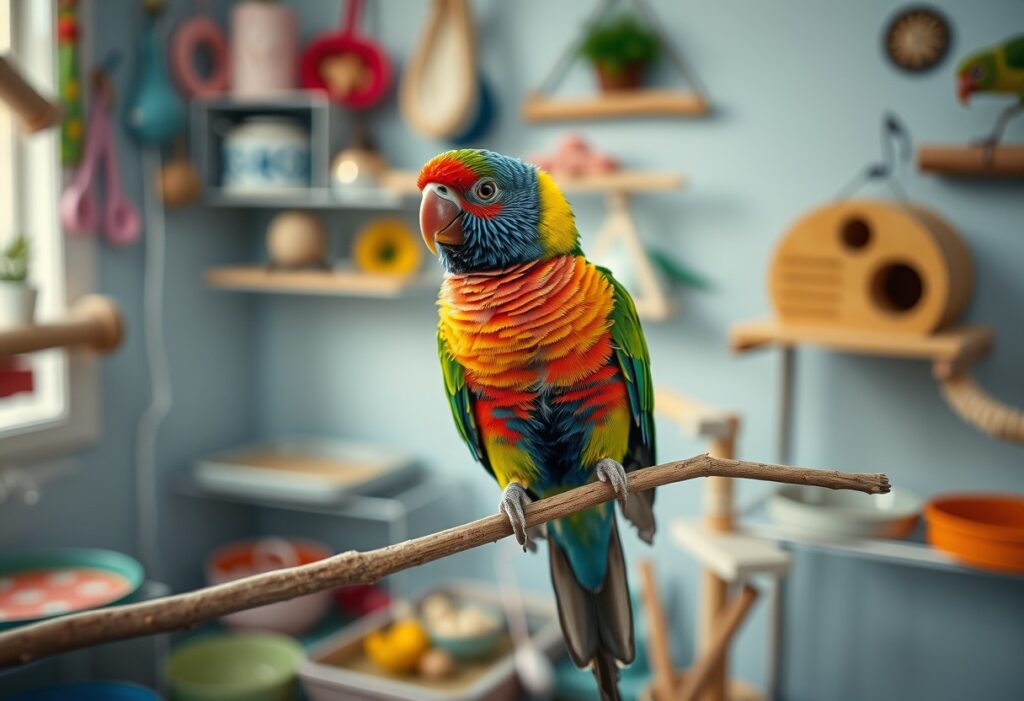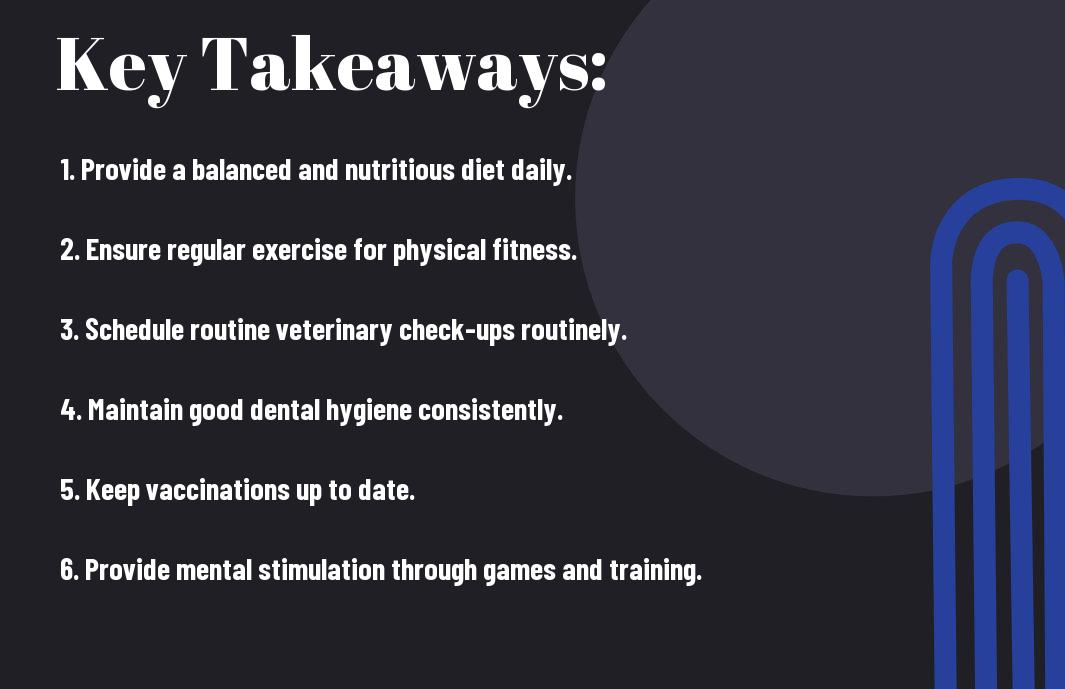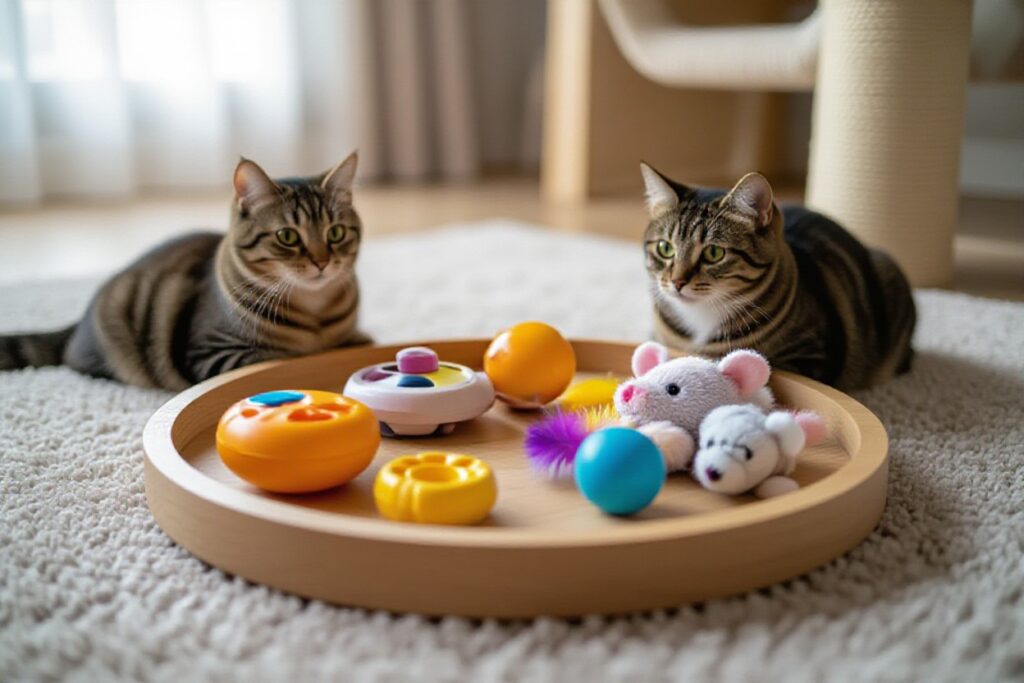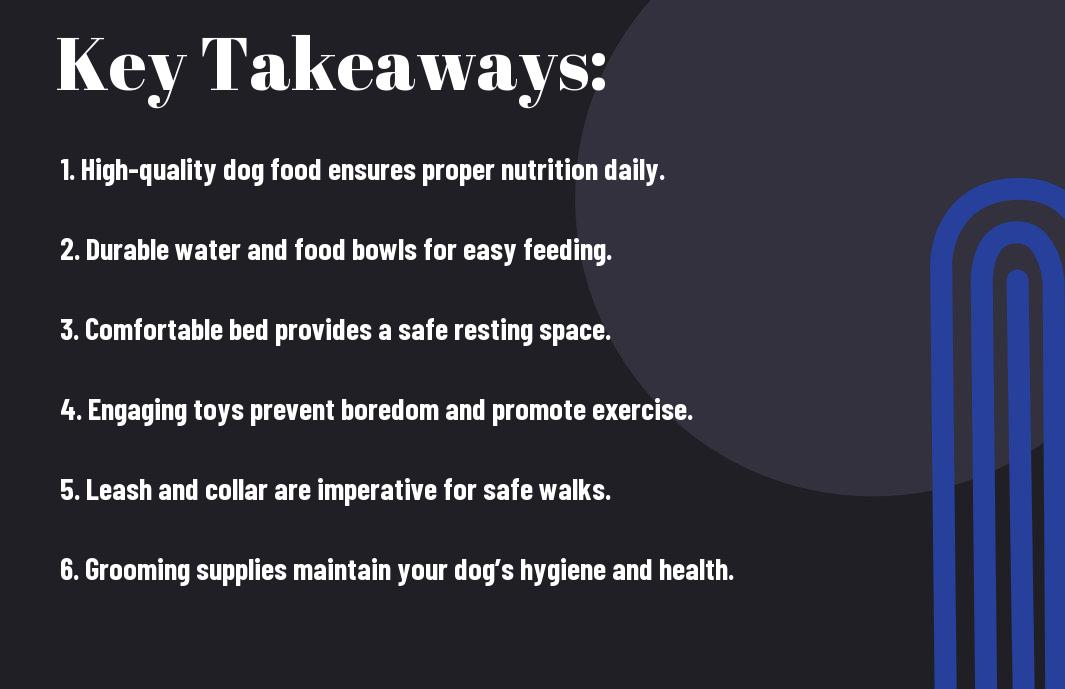Behavior can become unpredictable when your bird enters a hormonal phase, leading to challenges that can affect both your and your feathered friend’s well-being. Understanding aggression and mating rituals is vital to provide appropriate care and ensure a harmonious environment. In this guide, you will learn effective strategies for managing your bird’s mood swings, recognizing stress signs, and implementing positive practices to promote their mental and physical health. By gaining insight into your bird’s behavior and needs, you can create a nurturing space that fosters bonding during this critical time.
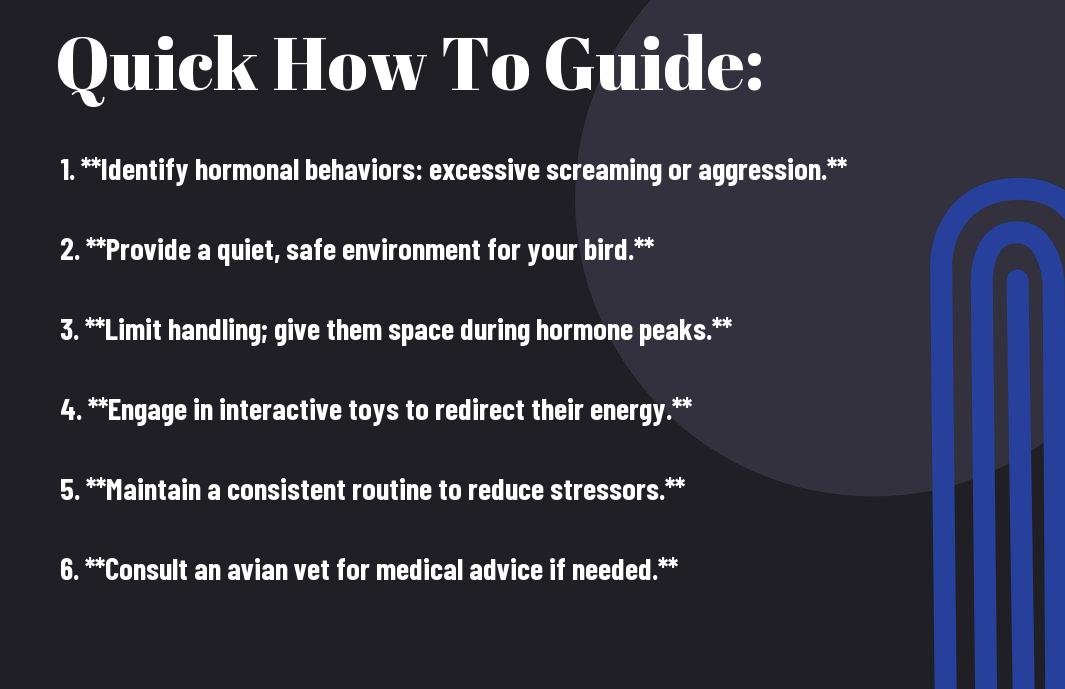
Understanding Hormonal Behavior in Birds
For many bird owners, understanding the hormonal behavior exhibited by their feathered companions can be quite a challenge. Hormonal changes can lead to a variety of behavioral shifts that may seem puzzling at first, but recognizing these signs is crucial for maintaining a healthy and happy environment for your bird. These changes often occur due to factors such as age, season, and breeding cycles. By being aware of these hormonal changes, you can take proactive steps to manage and support your bird during these times of fluctuation.
Recognizing Hormonal Changes
Birds can exhibit a range of behaviors that signal hormonal changes. These may include increased vocalization, aggression, or changes in appetite. You might notice your bird becoming more territorial, breeding behavior such as nest building, or even increased affection. Each species has specific signs, but the overarching theme is that hormonal shifts can lead to a wide variety of behavioral expressions. Paying close attention to your bird’s mood and habits can help you detect these changes early.
It is important to document and observe any changes in your bird’s behavior closely. By maintaining a journal or notes, you can track patterns and determine if certain triggers are responsible for these hormonal shifts. This will not only enable you to address issues more effectively but also guide your understanding of your bird’s unique behaviors.
Common Behavioral Issues
Even the most well-adjusted birds may experience common behavioral issues during hormonal episodes. These can include increased aggression and biting, vocalizing excessively, or even obsessive-compulsive behaviors such as feather plucking. It’s crucial to address these behavioral problems promptly, as they can lead to serious stress for both you and your bird. Understanding that these behaviors stem from hormonal changes can help you approach the situation with patience and empathy.
Understanding the root cause of these behaviors is crucial for developing a constructive plan for management. You can create a calming environment by minimizing stressors and providing adequate social interaction and enrichment. Recognizing that these behavioral issues are often temporary can provide both you and your bird with some relief, allowing you to work through them together.
Seasonal Behavior Trends
Little do many bird owners know that hormonal behavior can vary significantly by season. As your bird rides the wave of changing temperatures and daylight hours, you may notice fluctuations in behavior that align with these seasonal patterns. Spring and summer are particularly notable for heightened hormonal activity, often resulting in increased displays of mating behaviors and territoriality. Conversely, fall and winter may bring on a more subdued state. Understanding these seasonal changes will help you adapt your care routines accordingly.
Common seasonal behavior trends can include the onset of nesting behaviors during the breeding season, characterized by a bird’s attempt to gather materials for a nest or claiming a specific corner of their habitat as their own. Being mindful of these trends allows you to observe your bird more objectively and care for them in a way that accommodates their natural behaviors.
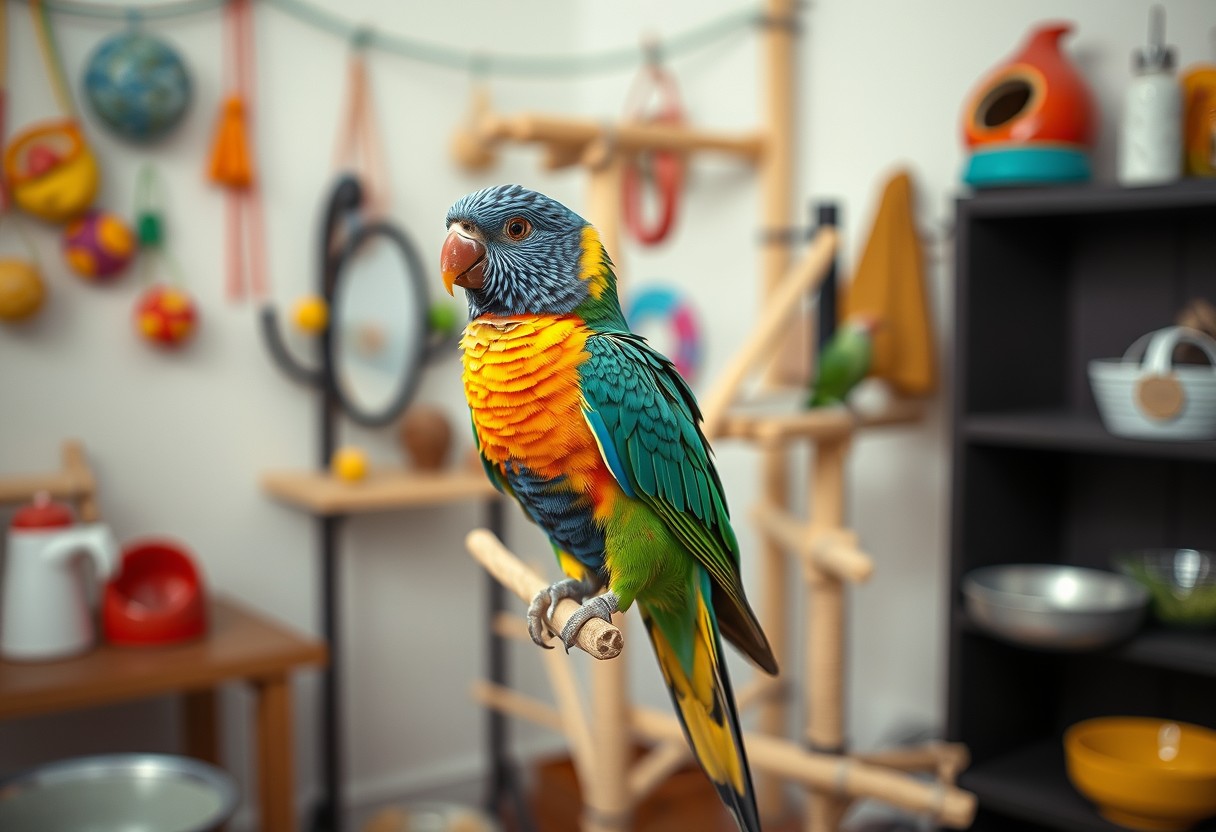
Essential Care Tips for Hormonal Birds
While dealing with hormonal behavior in your feathered friend can be challenging, understanding how to provide the right care is imperative for both their well-being and your peace of mind. Follow these imperative tips to help your bird transition through hormonal changes effectively:
- Create a stable environment
- Focus on proper nutrition and diet considerations
- Prioritize the importance of socialization
Creating a Stable Environment
You must establish a stable environment for your hormonal bird. This includes maintaining a consistent daily routine that helps your bird feel secure. Changes to their surroundings, such as moving their cage or introducing new pets, can increase stress and exacerbate hormonal behavior. Set regular times for feeding, social interaction, and play to build a reliable schedule that your bird can anticipate.
Additionally, ensure the cage is placed in a calm area of your home, away from loud noises and frequent disruptions. Use natural light to help regulate their hormonal cycles, as adequate exposure to daylight can support their overall health. The more stable you can make your bird’s environment, the less likely they will exhibit problematic behaviors during hormonal peaks.
Nutrition and Diet Considerations
Assuming you pay attention to your bird’s nutritional needs is crucial because a well-balanced diet can greatly influence their hormonal behavior. Hormonal fluctuations can lead to changes in appetite and cravings, which is why it is imperative to provide a variety of foods that meet their dietary needs. A diet rich in fruits, vegetables, and high-quality pellets can help keep them healthy and mitigate hormonal issues.
Moreover, avoid excessive treats or fatty snacks that may lead to weight gain and health issues. You might consider integrating supplements containing imperative vitamins and minerals if you’re concerned about nutritional gaps. This ensures your bird maintains a proper nutritional balance, which can play an imperative role in regulating their mood and behavior during hormonal changes.
Nutrition is not just about sustaining your bird; it also directly influences their behavior and emotional state, particularly during hormonal surges. Strive to provide a diverse range of nutrients to support their physical and mental health, keeping your bird lively and less prone to stress-induced behaviors.
Importance of Socialization
Stable social interactions are vital in managing your bird’s hormonal behavior. You need to engage with your feathered companion regularly to prevent them from feeling isolated, which can heighten their hormonal responses. Spend time playing, talking, and interacting with your bird to fulfill their emotional needs, ensuring they feel loved and secure.
In addition to one-on-one attention, consider introducing supervised social time with other friendly birds. Group interactions can help them develop social skills and mitigate excess hormonal frustration. However, be cautious with this approach, as not all birds will react positively to the presence of others. The key is to monitor and adjust based on your bird’s comfort level.
Environment plays a critical role in how well your bird socializes. A well-adjusted hormonal bird will thrive in an environment that reflects safety, comfort, and positive connections. Enhancing their social experiences can help reduce hormonal behaviors, making your efforts in nurturing their needs all the more rewarding.
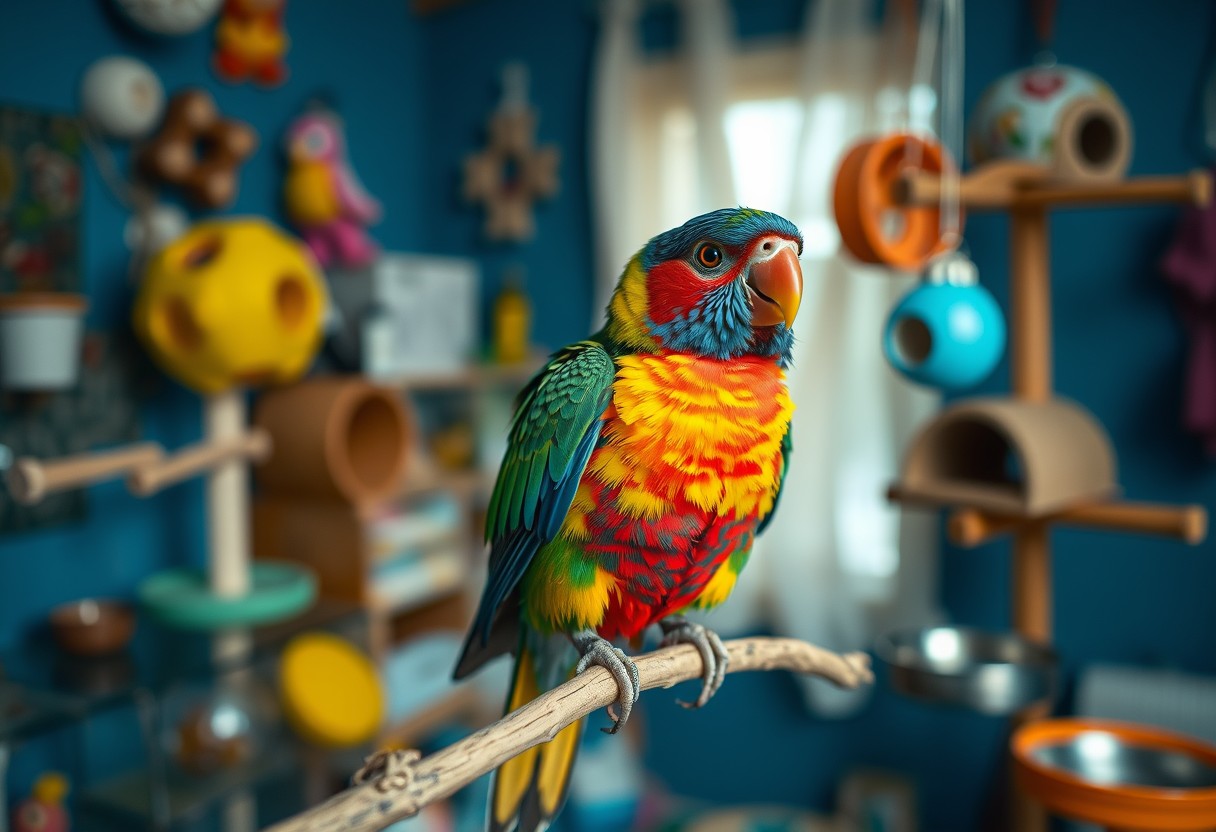
How to Manage Behavioral Issues
Once again, dealing with a hormonal bird can be challenging, especially when it comes to managing behavioral issues. Understanding the root cause of these behaviors and addressing them constructively is crucial for your bird’s overall well-being and your peace of mind. Hormonal shifts can lead to changes in mood, aggression, and even regression in learned behaviors. Therefore, it’s crucial to approach the situation with patience and the right strategies.
Redirecting Negative Behaviors
Negative behaviors often manifest in various ways, such as biting, screaming, or excessive feather plucking. Addressing these behaviors promptly is vital for ensuring that they do not become habitual. To redirect your bird’s focus away from negative behaviors, try providing an alternative action for them to perform. For example, if your bird is biting when it feels threatened, provide a safe toy that encourages it to chew instead. Consistency is key—repeating this process will help your bird learn more appropriate ways to express its feelings.
Creating an environment where negative behaviors are less likely to occur is also important. Removing stressors such as loud noises, sudden movements, or situations that may provoke anxiety can make a notable difference. By being proactive, you can help your bird manage its emotions and create a more harmonious living situation for both you and your feathered friend.
Positive Reinforcement Techniques
While negative behaviors can be a concern, employing positive reinforcement techniques can significantly enhance your relationship with your bird. Recognizing and rewarding desirable behaviors can encourage your bird to repeat them. For instance, if your bird shows calmness during a stressful situation, reward it with a favorite treat or praise. This approach not only reinforces positive behavior but also helps build trust between you and your bird, making it feel more secure.
Issues with hormonal changes can often lead to *unexpected reactions* in your bird. It’s crucial to keep a close eye on their behavior and apply positive reinforcement consistently to ensure your bird feels appreciated and understood. This method can greatly reduce the likelihood of repeated negative behavior and establish a solid foundation for behavioral management.
Providing Engaging Activities
With birds, boredom can lead to *destructive behaviors*. To prevent this, it’s crucial to provide a variety of stimulating activities to keep their minds and bodies engaged. Incorporate toys, puzzles, and foraging activities that challenge their intelligence and mimic natural behaviors. Giving your bird opportunities to explore, climb, and play can create a healthier environment and prevent issues stemming from frustration or excess energy.
The benefits of engaging activities cannot be overstated. Ensuring your bird has access to different forms of entertainment not only wards off boredom but also exercises their natural instincts. This helps minimize behavioral problems and establishes a stronger bond between you and your bird, making care and interaction pleasurable for both parties.
Factors Affecting Hormonal Behavior
Keep in mind that understanding the various factors affecting your bird’s hormonal behavior is crucial for providing effective care. Many elements can contribute to hormonal shifts, and being aware of these can help you manage your pet’s actions appropriately. Here are some key factors to consider:
- Age and maturation
- Breeding season influences
- Environmental stressors
Age and Maturation
Hormonal behavior in birds is heavily influenced by their age and maturation stage. As your bird grows, it will experience changes in hormonal levels, particularly during the puberty phase, which typically occurs between 6 months to 1 year, depending on the species. During this time, you may notice intensified behaviors such as increased vocalizations, aggressive tendencies, or a desire to mate. These changes are a natural part of growing up.
Being aware of your bird’s developmental phases will help you prepare for and respond appropriately to these hormonal surges. It’s necessary to maintain a balanced environment and provide your feathered friend with the necessary mental and social stimulation to help ease these transitions. Thou, as the responsible caregiver, you should take the lead in managing these behaviors with love and understanding.
Breeding Season Influences
Factors such as the breeding season can significantly impact your bird’s behavior. During this period, birds typically exhibit increased reproductive instincts, which can manifest in various ways, including nest building, territoriality, and heightened vocalizations. You may find your bird becoming more demanding for attention or displaying aggressive behaviors towards perceived threats.
To manage these seasonal behaviors, it’s important to understand your bird’s natural reproductive cycles. As daylight hours increase, these biological changes often trigger a surge in hormones, leading to the behaviors you observe. Adjusting your bird’s lighting conditions and providing appropriate distractions can help mitigate some of these hormonally driven actions.
Environmental Stressors
Influences such as environmental stressors also play a significant role in hormonal behavior. Factors like loud noises, changes in habitat, or the presence of unfamiliar pets can create stress for your bird, leading to increased hormonal activity. Stress responses can lead to negative behaviors, including biting, feather plucking, or excessive vocalization, making it necessary for you to maintain a calm and safe environment.
Plus, reducing environmental stressors can foster a well-adjusted pet. Ensure your bird has a quiet space to retreat when overwhelmed and consistently provide mental and physical enrichment to help them cope with life’s challenges. Keeping a close watch on your bird’s reactions to various stressors will enable you to tailor your approach and provide the best care, ultimately leading to a happier, healthier companion. Recall, understanding your bird’s unique temperament and stress triggers is vital in helping them thrive.
Conclusion
Taking this into account, understanding and managing a hormonal bird requires a combination of patience, knowledge, and proactive care. As you navigate through your bird’s hormonal fluctuations, it’s important to identify the specific behaviors associated with these changes. You should create an environment that minimizes stressors and encourages natural behaviors, while also recognizing the importance of social interaction and mental stimulation. Your role as a caregiver is pivotal in helping your feathered friend through these periods, allowing you both to enjoy a harmonious bond.
Additionally, routine evaluations of your bird’s environment and social needs can help you effectively manage hormonal behavior. Establishing a consistent care routine can enhance your bird’s well-being, promoting positive interactions and reducing hormonal triggers. Take the time to educate yourself on avian behavior and consider consulting with an avian veterinarian for tailored advice. By being vigilant and responsive to your bird’s needs, you can maintain a healthy, rewarding relationship with your pet for years to come.
Q: What are the common signs of hormonal behavior in birds?
A: Hormonal behavior in birds can manifest in various ways. Common signs include increased aggression, particularly during the breeding season; excessive vocalization; territorial displays, such as puffing up feathers or lunging; and changes in nesting behavior, including the construction of makeshift nests in inappropriate places. Additionally, some birds may become more affectionate one moment and aggressive the next, which can be confusing for owners. Observing these behaviors can help owners identify when their birds are experiencing hormonal changes.
Q: How can I manage my bird’s hormonal behavior effectively?
A: Managing a bird’s hormonal behavior involves several strategies. First, it’s important to recognize the triggers that may be causing hormonal changes, such as seasonal changes, increased daylight exposure, or certain hormonal foods. Reducing the length of daylight that your bird is exposed to can help by mimicking natural conditions. Providing environmental enrichment and mental stimulation can also redirect excess energy and reduce hormonal displays. Setting firm but gentle boundaries around aggressive behavior and removing triggers (like mirrors or other birds) during peak hormonal seasons can help calm your bird. Consulting with an avian veterinarian for tailored advice may also be beneficial.
Q: Are there any specific diet changes that can help reduce hormonal behavior in birds?
A: Yes, diet can significantly impact a bird’s hormonal behavior. It’s advisable to limit high-fat foods and seed-based diets, as these can contribute to hormonal surges. Instead, focus on a well-balanced diet that includes pellets, fresh fruits, and vegetables. Incorporating some non-breeding specific foods, like whole grains, can also help in reducing hormonal triggers. Additionally, avoid any foods known to stimulate breeding behavior, such as certain sprouted seeds or specific supplements. Always consult with an avian nutritionist or veterinarian for guidance on the best dietary practices for your bird during hormonal seasons.
